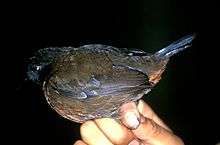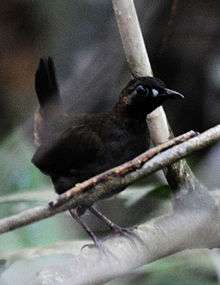Formicarius (bird)
Formicarius is a genus of passerine birds in the family Formicariidae. These birds are all found in the tropical New World, from southern Mexico south to Central America and northern South America. All are named as antthrushes, and are insectivorous forest birds. They are largely terrestrial, feeding mainly on the ground on ants and other insects.
| Formicarius | |
|---|---|
 | |
| Rufous-breasted antthrush (Formicarius rufipectus) | |
| Scientific classification | |
| Kingdom: | Animalia |
| Phylum: | Chordata |
| Class: | Aves |
| Order: | Passeriformes |
| Family: | Formicariidae |
| Genus: | Formicarius Boddaert, 1783 |
| Species | |
| |
Taxonomy
The genus Formicarius was introduced by the Dutch naturalist Pieter Boddaert in 1783 in his catalogue of the ten volumes of hand-coloured plates that had been engraved by François-Nicolas Martinet. The plates were produced to accompany Georges-Louis Leclerc, Comte de Buffon's Histoire Naturelle des Oiseaux.[1] The type species was subsequently designated as the rufous-capped antthrush (Formicarius colma) by the English zoologist George Robert Gray in 1840.[2][3] The generic name Formicarius is Latin for "of the ant".[4]
The genus contains six species:[5]
| Image | Common Name | Scientific name | Distribution |
|---|---|---|---|
.jpg) | Rufous-capped antthrush | Formicarius colma | Bolivia, Brazil, Colombia, Ecuador, French Guiana, Guyana, Peru, Suriname, and Venezuela. |
 | Black-faced antthrush | Formicarius analis | from Honduras through Central America to Colombia, Venezuela, Trinidad and Brazil |
| Mayan antthrush | Formicarius moniliger | southern Mexico through northwestern Honduras. | |
| Rufous-fronted antthrush | Formicarius rufifrons | southeastern Peru, northwestern Bolivia (Pando), and far southwestern Brazil | |
| Black-headed antthrush | Formicarius nigricapillus | Caribbean slope of eastern Costa Rica and both slopes of Panama to Chocó of western Colombia and Ecuador. | |
_(25452497347).jpg) | Rufous-breasted antthrush | Formicarius rufipectus | Colombia, Costa Rica, Ecuador, Panama, Peru, and Venezuela. |
References
- Boddaert, Pieter (1783). Table des planches enluminéez d'histoire naturelle de M. D'Aubenton : avec les denominations de M.M. de Buffon, Brisson, Edwards, Linnaeus et Latham, precedé d'une notice des principaux ouvrages zoologiques enluminés (in French). Utrecht. pp. 43, 44, 50.
- Gray, George Robert (1840). A List of the Genera of Birds : with an Indication of the Typical Species of Each Genus. London: R. and J.E. Taylor. p. 26.
- Peters, James Lee, ed. (1951). Check-list of Birds of the World. Volume 7. Cambridge, Massachusetts: Museum of Comparative Zoology. p. 239.
- Jobling, James A. (2010). The Helm Dictionary of Scientific Bird Names. London: Christopher Helm. p. 162. ISBN 978-1-4081-2501-4.
- Gill, Frank; Donsker, David, eds. (2019). "Antthrushes, antpittas, gnateaters, tapaculos & crescentchests". World Bird List Version 9.1. International Ornithologists' Union. Retrieved 14 August 2019.
- Ffrench, Richard (1991). O'Neill, John P.; Eckelberry, Don R. (eds.). A Guide to the Birds of Trinidad and Tobago. ISBN 0-8014-9792-2.
- Hilty, Steven L. Birds of Venezuela. ISBN 0-7136-6418-5.
- ITIS
- Stiles, F. Gary; Skutch, Alexander F. A guide to the birds of Costa Rica. ISBN 0-8014-9600-4.